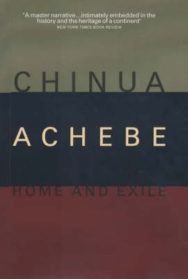
ABOUT THIS BOOK
PUBLISHER: Canongate Books
FORMAT: Paperback
ISBN: 9781841953854
RRP: £8.99
PAGES: 128
PUBLICATION DATE:
February 21, 2003
BUY THIS BOOK
As an Amazon Associate and Bookshop.org affiliate we earn from qualifying purchases.
Home and Exile
Chinua Achebe
This trenchant and illuminating book by one of Africa’s most influential and celebrated writers is a major statement on the importance and dangers of stories, one in which Achebe makes telling use of his personal experiences to examine the political nature of culture and specifically literature. It is the weaving of the personal into the bigger picture that makes Home and Exile so remarkable and affecting. It’s the closest we are likely to get by way of Achebe’s autobiography but it is also a brilliantly argued critique of imperialism. Achebe challenges the way the West has appropriated Africa with a particular emphasis on how ‘imperialist’ literature has been used to justify its dispossession and degradation. Above all this is a book that articulates persuasively why literature matters. Stories are a real source of power in the world, Achebe concludes, and to imitate the literature of another culture is to give that power away.
Reviews of Home and Exile
* The value of Achebe's book is … to insist that literature matters. Financial Times * A moving account of an exceptional life … Achebe reveals the inner workings of the human conscience through the predicament of Africa and his own intellectual life … A story of the triumph of the mind, told in the words of one of the century's most gifted writers. — Henry Louis Gates Jr * A book that anyone concerned with advancing social justice and human dignity should read. Seattle Times * In defining the dignity and vibrancy of African literature, Chinua Achebe defies the stranglehold of colonial, imperialist and cultural dispossession. He brings us into balance with a world of literature and hope that the West with its myth of primacy denies. — Walter Mosley
Chinua Achebe
Chinua Achebe was born in Nigeria in 1930, and in a long and distinguished career has published novels, stories, essays and poems.Cited in the Sunday Times as one of the “1,000 Makers of the Twentieth Century” for defining “a modern African literature that was truly African” and thereby making “a major contribution to world literature”. Achebe has received more than 30 honorary doctorates from universities around the world. In 2007 he was awarded the Man Booker International Prize. He lives with his wife in Annandale-on-Hudson, where they teach at Bard College. They have four children.









